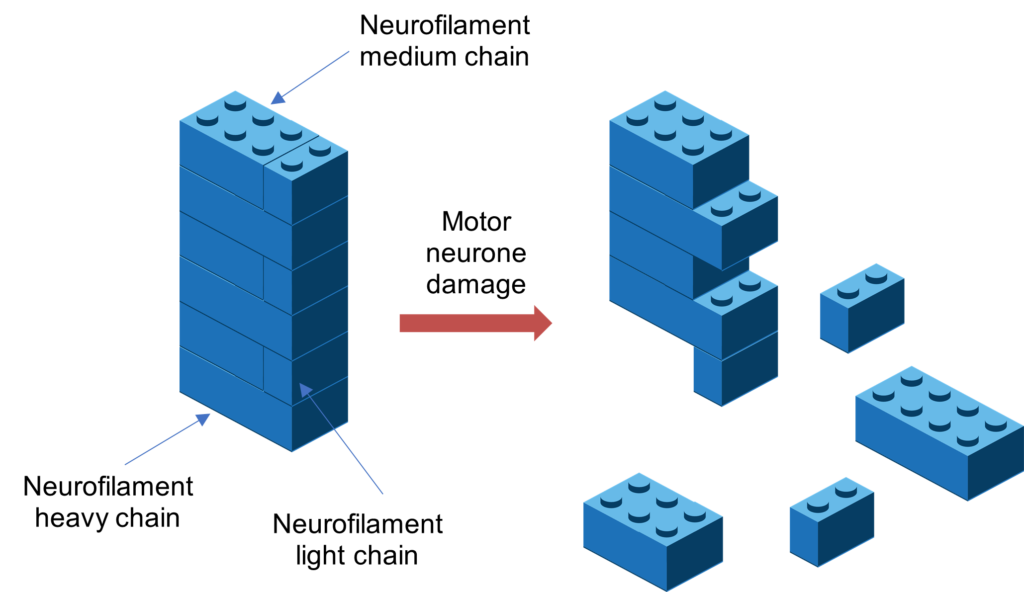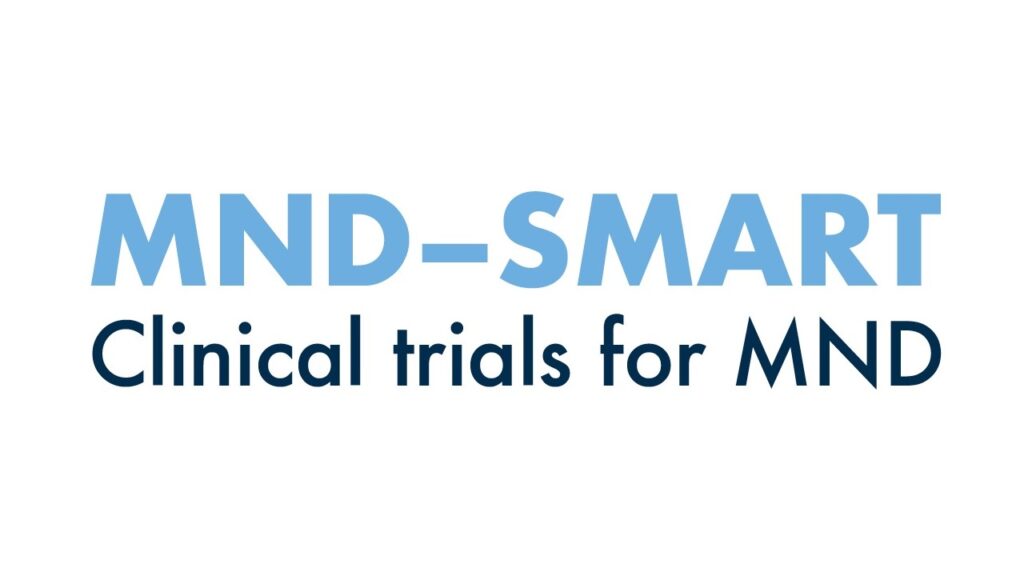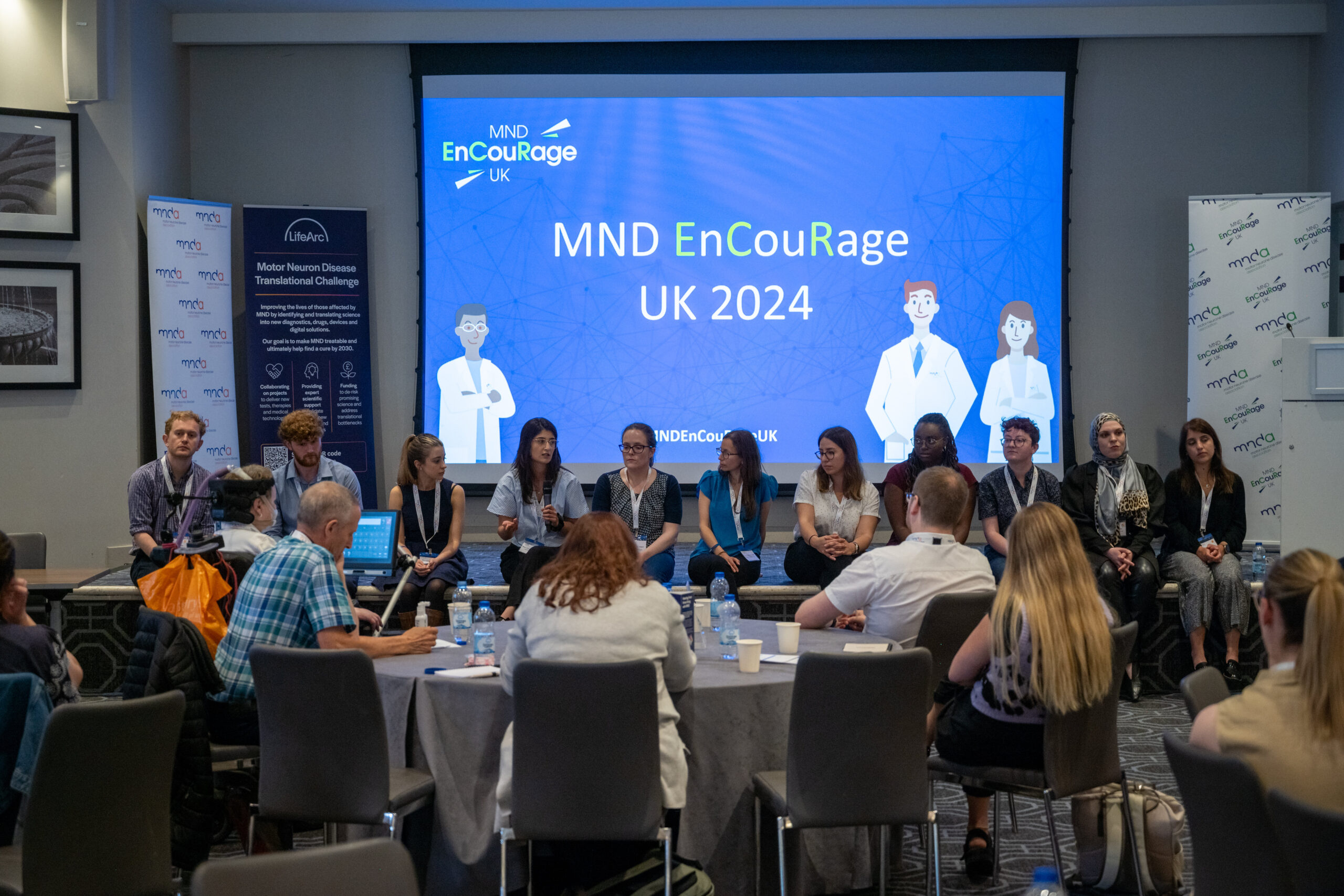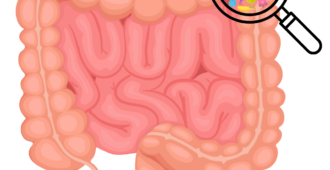MND is a very complex disease, and in the UK there is still only one approved treatment so the need for more effective treatments remains at the forefront of MND research. There have been over 140 clinical trials for MND over the last several decades and the majority of these have, unfortunately, not led to new and effective treatments for the disease.
Due to this, there is a focus on improving the design of clinical trials but we also need to consider ways to ensure that only the most promising drugs make it to larger clinical trials. A new platform, called EXPErimental medicine Route To Success in ALS (EXPERTS-ALS), has been announced which aims to quickly identify promising drugs to take forward to large clinical trials. This platform is a flagship project of the UK MND Research Institute and is being funded by the Department of Health and Social Care (through the National Institute for Health and Care Research), with additional investment from the MND Association, MND Scotland, My Name’5 Doddie Foundation and LifeArc.
What is EXPERTS-ALS?
EXPERTS-ALS is a new and innovative project, led by Professor Chris McDermott (University of Sheffield) and Professor Martin Turner (University of Oxford), that will rapidly test drugs to assess their potential to slow MND progression.

Usually, possible treatments identified in the lab undergo several stages of testing in cell and animal models of the disease to determine whether they show enough promise to be tested in clinical trials. This means that it can take many years from a potential treatment being identified to testing in a large clinical trial. Even though some drugs show promise when tested in the lab, they are not always found to be effective when tested in people with the disease. This is because models of the disease may not accurately represent all of the complex disease processes that happen in people with MND.
This new platform aims to reduce the time it takes to get a possible treatment from ‘bench to bedside’. EXPERTS-ALS enables selected drugs to be tested in people with MND earlier rather than continuing testing in the lab, to investigate whether they show early signs of benefit. The most promising drugs can then be tested further in clinical trials to examine if the drugs have long-term benefits. Testing potential treatments in people with MND earlier might mean that drugs chosen to progress to larger clinical trials in the future are more likely to show benefit and have a higher chance of success.
How will this platform work?
The platform will test three drugs at any one time and, to start with, these will be repurposed drugs. These are drugs that have already been approved for use for other diseases and are known to be safe. EXPERTS-ALS will test repurposed drugs that have been investigated in the lab and shown some signs of possible benefit in MND.
This platform will involve 11 MND centres across the UK and people will be given the opportunity to take part in the platform at the point of diagnosis. They will take one of three drugs being tested at that time. Participants will all take a drug, as there is no placebo, for up to 6 months and regular blood samples will be taken.
How will signs of benefit be measured?
EXPERTS-ALS is assessing the benefit of a potential treatment by measuring a marker of disease activity within the body, called neurofilament light chain (NfL). This is a protein that helps to maintain the structure of motor neurons and can be used as a marker of neuron damage as levels of NfL in the blood rise as neurons are damaged and dying.
Previous research has found that NfL rises in the months before symptoms of MND develop and levels of NfL at the time of diagnosis are strongly linked to the rate of disease progression. In general, higher levels of NfL indicate faster progression and lower levels indicate slower progression so it is highly likely that lowering NfL reflects slowing of disease progression.

Participant’s levels of NfL are measured at several points throughout the study by taking blood samples. These levels are observed before treatment begins to establish the person’s levels before they try the drug and will be compared with levels while on the drug. If the treatment is found to significantly reduce levels of NfL, when looking at data from the whole group of participants, it suggests there are early signs of benefit. The drug will then be prioritised for further testing.
It is important to note that even if a drug is not found to lower levels of NfL, it may still be beneficial for people with MND. Currently NfL is one of the most promising biomarkers for MND, but as our knowledge of the disease increases, we may discover other biomarkers that better reflect the effects of potential treatments. The team will be using blood samples from participants to help identify more potential biomarkers of the disease, which could be added to the measurements used in EXPERTS-ALS in the future. Analysis of blood samples from participants will also be conducted to increase our understanding of why some individuals show different responses to treatments compared to the overall group.
Why do these drugs still need to be tested in another trial?
While EXPERTS-ALS will help to identify the most promising drugs, it will not be able to prove whether the possible treatment will have long term benefit for MND. Any drugs found to show early signs of effectiveness in EXPERTS-ALS will still need further testing in other trials, such as MND-SMART. This is because it is essential to still test potential treatments in a randomised controlled trial, where participants are randomly assigned to receive either the drug or placebo. This is so any effects of the drug can be compared to the natural disease course to determine if taking the treatments leads to a significant benefit. The larger trials will also investigate any possible long-term benefits of the treatment in more people with MND.

RELATED POST
Blog | 19 June 2023 | Eleanor Green
Keeping MND-SMART moving
Who can get involved?
EXPERTS-ALS is hoped to be open to as many people with MND as possible. As with all clinical trials, there will be some people who are unable to take part. If someone has a form of MND that progresses a lot slower than average, they may not be able to take part. This is because their blood NfL levels may not be high enough to allow any significant change in response to the drug to be detected. There may also be some people with MND who are intolerant to some of the drugs being tested. While not everyone with MND may be able to take part, any drugs that are found to be beneficial in the larger trials will eventually be available to everyone with MND.
This is an exciting new project launched under the newly created UK MNDRI. It shows that work is underway to accelerate the number and quality of drugs put forward for clinical trials and is a welcome step forward in the fight against MND. The MND Association is delighted to provide funding to support such innovative and collaborative research projects, which further highlight the commitment and dedication of the research community in finding effective treatments.
Dr Sophie Nyberg, Research Programmes and Partnerships Manager at the MND Association.
The team behind EXPERTS-ALS are currently working hard to get the platform set up across the 11 participating sites in the UK. They hope to start testing the first drugs in people with MND during the Summer of 2024. We are proud to be supporting this ground-breaking drug testing platform and we’ll share any updates on EXPERTS-ALS on our twitter account, research monthly newsletter and latest news page.






